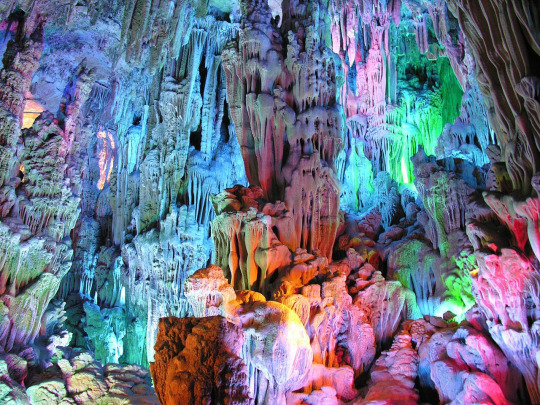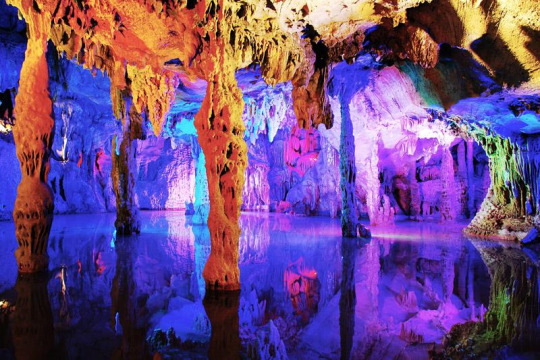#reed flute cave
Text
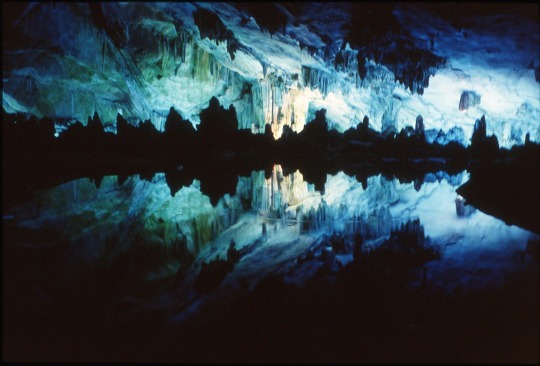
Reflection in the Reed Flute Cave, Guilin, 2001
Mickey Crisp
14 notes
·
View notes
Text
Reed Flute Cave, Guilin, China

© Peter Stewart
3 notes
·
View notes
Link
Reed Flute Cave China
Reed Flute Cave, also known as Ludi Yan, is a natural limestone cave located in Guilin, Guangxi, China. The cave got its name from the reeds growing outside, which can be made into flutes. The cave is around 240 meters long and features a vast array of stalactites, stalagmites, Rock columns, stone curtains, and other unique rock formations. The colorful lights inside the cave illuminate the cave's natural beauty, and there are several chambers inside the cave, each with its own unique features. Reed Flute Cave has a long history of human occupation, with evidence of people living in the cave dating back 1800 years. In the Tang Dynasty (618-907), it was a popular tourist attraction, and in the 1940s, it was opened to the public as a tourist destination. Reed Flute Cave China is one of the most popular tourist attractions in Guilin and attracts visitors from all over the world. It is a beautiful natural wonder and a testament to the power of nature's forces over millions of years.
0 notes
Text
So I saw this the other day and while it isn't technically Tav but still my OC and I felt like doing it, have some Vlassk OC ... template? meme? Idk, have a thing
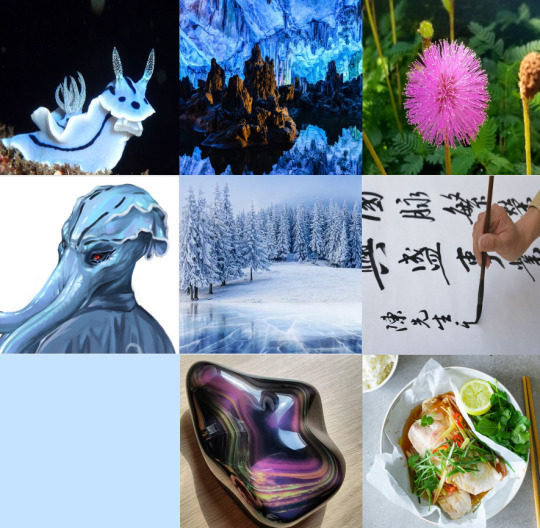
Animal: Pale Blue Nudibranch Sea Slug | Place: Reed Flute Cave, Guilin - China | Plant: Sunrise Mimosa | Season: Winter | Hobby: Calligraphy | Color: Baby Blue | Crystal: Rainbow Obsidian | Food: Lemongrass and Ginger Fish
7 notes
·
View notes
Text
China's ethereal Reed Flute Cave has served humans for survival, shelter, as well as spiritual needs. It's now a tourist attraction known as the Palace of Natural Arts.
29 notes
·
View notes
Text
so i found the real Hidden World
7 notes
·
View notes
Note
i would love if you'd shared everything that might be in aelin's list in a world away, all the dream places she wants to go or already went 🤧🥺
First of all - I am so sorry it’s taken me so long to answer this ask 😭
Second - this list is in no way complete. I could probably double it if I gave it some more time (and maybe I’ll edit this post and add some later) but I wanted to answer this ask.
Third - some things listed are cities, some are attractions, some are landmarks or monuments…it’s really a mix of everything. And some major landmarks that cover more than one country are only listed once.
A World Away
So, without further ado, please enjoy
Aelin’s Incomplete and Ever-Adapting World Travel List ✈️
Antarctica
Argentina
Iguazú Falls // Patagonia // Rainbow Mountains // Buenos Aires
Australia
Melbourne // Sydney // Gold Coast // Great Barrier Reef // Adelaide
Austria
Vienna // Salzburg // Hallstatt
the Bahamas
Belgium
Bruges // Brussels
Belize
the Great Blue Hole
Bhutan
the Himalayas
Bolivia
Salar de Uyuni
Bosnia and Herzegovina
Stari Most Bridge // Mostar
Brazil
Rio de Janeiro // Christ the Redeemer // Amazon Rainforest // Lençóis Maranhenses National Park // Sao Paolo
Bulgaria
Cambodia
Angkor Wat
Canada
Niagra Falls // Vancouver // Banff // Toronto
Chile
Easter Island // Torres del Paine National Park // Marble Caves
China
Great Wall of China // Beijing // Shanghai // the Summer Palace // Potala Palace // Tianmen Mountain // Reed Flute Caves // Zhanye Danxia
Costa Rica
San Jose
Croatia
Dalmatian Coast // Diocletian's Palace // Krka waterfall park // Plitvice Lakes // Zagreb
Cuba
Havana
Czech Republic
Prague
Denmark
Copenhagan
Dominican Republic
Ecuador
Quito // Galapagos Islands
Egypt
Cairo // The Great Pyramids & Sphinx // Nile River // Valley of the Kings // Luxor // Aswan
England
London // Thames River // Stonehenge
Estonia
Tallinn
Fiji
Finland
Helsinki
France
Mont-Saint-Michel // Louvre // Eiffel Tower // Alsace Lorraine // Paris // Notre Dame // Sacre Coeur // Versailles // Nice
French Polynesia
Bora Bora // Tahiti
Germany
Munich // Berlin // Black Forest // Oktoberfest // Neuschwanstein Castle
Greece
Santorini // Athens // Parthenon // Roman Agora // Acropolis // Mykonos // Oia // Fira // Corfu // Meteora
Greenland
Hong Kong
Tsim Sha Tsui
Hungary
Budapest // Capitol Hill // Bath Houses
Iceland
Reykjavik // Northern Lights // Egilsstaðir //Ring Road // Blue Lagoon // Vatnajökull National Park // Kirkjufell // Húsavík // Akureyri // Thingvellir National Park
Italy
Roman Colosseum // Amalfi Coast // Florence Duomo // Venice at Carnival // Piazzale Michelangelo // Cinque Terre // Pisa // Venice // Pompeii // Milan
India
Taj Mahal // Varanasi & Ganges River // Golden Temple // Agra // Mumbai // New Delhi
Indonesia
Bali // Komodo Island // Blue Flames at Ijen Volcano // Jarkarta
Iran
Hall of Diamonds
Ireland & Northern Ireland
Cliffs of Moher // Giants Causeway // Galway // Blarney Stone // Trinity College // O'Neills // Belfast // Carrick-a-Rede Rope Bridge // Cobh
Isreal
Dead Sea // Jerusalem
Jamaica
Japan
Tokyo // Mount Fuji // Wisteria Gardens // Osaka // Kyoto
Jordan
Petra // Amman
Kazakhstan
Kenya
Maasai Mara National Park // Lake Victoria
Kyrgyzstan
Luxembourg
Madagascar
Avenue of the Baobabs
Malaysia
Kuala Lumpur // Batu Caves
the Maldives
Male
Malta
Valletta
Mexico
Cabo // Teotihuacán // Chichen Itza // Cabo // Yucatan Peninsula // Mexico City
Mongolia
Gobi Desert
Morocco
Casablanca // Hassan II Mosque // Marrakesh // Chefchaouen // Sahara Desert
Myanmar
Bagan's Temples
Namibia
Nepal
Mount Everest // Kathmandu
the Netherlands
Amsterdam // Van Gogh Museum // Tulip Festival
New Zealand
Auckland // Queenstown // Kawarau Suspension Bridge // Milford Sound // Tongariro National Park // Hobbitton // Dark Sky Sanctuary // Waitomo Caves
Nigeria
Lagos
Norway
Oslo
Panama
Panama City
Peru
Machu Picchu & Huayna Picchu // Lima // Aguas Calientes // Andes Mountains // Huacachina
Philippines
Palawan // Manila
Poland
Krakow
Portugal
Lisbon
Romania
Russia
Moscow // St Petersburg
Rwanda
Volcanoes National Park
Saint Lucia
Samoa
Saudi Arabia
Al-Masjid an-Nabawi
Scotland
Edinburgh // Loch Ness // Inverness // Glasgow // Scottish Highlands
Singapore
Marian Bay Sands
Slovenia
Lake Bled
South Africa
Capetown // Johanessburg // Isle of Elephants
South Korea
Seoul // Jeju Island
Spain
Barcelona // Madrid // Sagrada Familia // Mosque of Cordoba
Sweden
Stockholm // Sweddish Lapland
Switzerland
the Alps // Bern // St Moritz
Tanzania
Mount Kilimanjaro // Serengeti
Thailand
Bangkok // the Grand Palace // Phuket
republic of Türkiye
Cappadocia // Istanbul // Hagia Sophia // Pamukkale
Turkmenistan
Darvaza gas crater
Turks & Caicos
United Arab Emirates
Dubai // Burj Khalifa
United States
Grand Canyon // San Fransisco // Honolulu // Kauai // New Orleans // New York City // Seattle // Portland // Los Angeles // Antelope Canyon // MOMA // Las Vegas
Vanuatu
the Vatican
St. Peter's Basilica // The Vatican Museum // Sistine Chapel
Vietnam
Ha Long Bay // Hoi An // Hanoi
Zambia
Victoria Falls
5 notes
·
View notes
Text

The Greek God of The Wild, Shepherds, Flocks, Music, Fertility, and Hunters. Known as "Faunus" by the Romans and is perhaps the Son of Hermes. He is also a companion of the Nymphs while said to be the Father of Satyrs and Fauns and his main instrument is a panpipe.
Despite that he was also a Deity of Nature, he was often affiliated with Sex which could mean that Pan is also a God of Fertility and Spring. While Hermes might've been his own Father, his Mother is unknown but is clearly stated in other versions. In the "Homeric Hymn", his Mother was perhaps a Unamed Daughter of Dryops or Penelope (Odysseus' Wife). In his earliest first appearance of literature that Pan was once accositated with a Mother Goddess by the name either "Cybele" or "Rhea".
His own worship began around in Arcadia which was always the principal seat of his worship considering that Arcadia was a district of Mountain People, separating from other Greek People. Arcadian Hunters used to scourge the statue of the Said God if they were to be disappointed in the chase. Despite being a rustic god that he was, Pan was not widely worshipped in temples but in other settings such as Caves or Grottos but also in the Acropolis of Athens which were often refered to as "The Cave of Pan".
Archaeologists were at a Byzantine Church in Banyas discorved the walls of a church of an altar version of Pan with a Greek Inscripiton dating back in the 2nd/3rd Century as the inscription says "Atheneon son of Sosipatros of Antioch is dedicating the altar to the god Pan Heliopolitanus. He built the altar using his own personal money in fulfillment of a vow he made."
In the Mystery Cults of the Highly Hellenistic Era, Pan was idenfitied with the Greek Gods (Phanes/Protogonos, Zeus, Dionysus and Eros).
The Three Epithets of Pan were "Aegocerus" describing Pan of his own figure of having the Horns of a Goat, "Lyterius" which reveals that perhaps Pan was believed during a plague that revealed dreams by the proper remedy against the disease, and lastly "Maenalius" which was sacred to Pan a Goat.
In his most famous myth was how he got his own special instrument. He spotted a beautiful nymph named "Syrinx" (who was a Daughter of the River God, Ladon) after she returned from a hunting day, Pan was deeply in love with the Dryad but since Syrinx rejected the Wild God's Love as she ran away from him until when she came towards her sisters who immeditaly turn her into a reed. When the wind blew through the reeds it produced a Melody. Because of this, Pan took her own reed and turned into his own flute to in which whenever he played, he would play a song through his own instrument of his own love for the Dryad.
In another Myth, when the Nymph Echo sang such Beautiful songs which caused the Men to instantly fell for her including Pan himself. But as Echo rejected the God's love for her, it made Pan furious as he ordered his followers to kill her as Echo's bodies was torn to pieces and spread all over the earth which lead Gaia to recieve the pieces of Echo, whose voice still remains in the repeating of others.
Another one of Pan's Other Lovers was a nymph named "Pitys" who was turned into a pine tree and even a Boy named "Daphnis" who Pan taught him how to play music as he also fell in love with the boy.
In a Music Contest between Pan and Apollo, King Midas had to judge which of their own song was the brightest, Pan won the competion by Midas because liked his own music which made Apollo easily jealous at heart as Apollo cursed King Midas to have Donkey Ears.
He was also known to be a companion to the God of Parties and Wine (Dionysus).
SBSP Universe
Pan is the Greek God of The Wild, Shepherds, Flocks, Music, and Fertility. He is the Caretaker of the Wild as well as the King of the Forest and Satyrs as he rules over the Woods by his many Animal Companions.
His Roman Counterpart is Faunus.
Pan is rather clever, stylish, and flamboyant but can be rather a little scarcastic in his own way as he has a flair to be a little dramatic and doesn't take his own job as being King of the Forest seriously but would rather do it in his own fun way, especially whenever he likes to play his own music. He also has a good habbit of eating fruit as Pan prefers to eat either Apples, Peaches, or Pears. He is also greatfully upon a womanizer as Pan likes to flirt and tease girls, mostly commonly the Nymphs.
In his earilest life before he became King of the Wilds, Pan often had a spoiled life which made his own Parents kick him out as their own Son had to go live on his own for now on. Upon his own travels, Pan stumble upon Hermes and asked him on which direction where to Go, Hermes suggested Pan to go into a Village where Pan stayed in a Human Village for a Vacation. Upon Pan's visit to a village, his vacation seemed rather messy to the Human Society due to how lazy and irreponsible he was as he often acted like a Goat which pissed off many of the Mortals so they instantly kicked him out. Only then, did the Satyr realized that it was now up to him to find a new home.
During his new travel, Pan was then acompanied by Animals who took him in the forest after Pan was passed out drunk so the Satyr Man decided to make the Woods his own home for a little awhile while focusing on how to take care for himself.
Oddly enough, as Pan was now living in the Woods, he stumbled upon some reed as he took it and decide to make it into a flute which made him a try a new talent (which was Music). Of course, this music of his coming from his own new instrument cause an unpexected attraction towards the Animals as the Beasts in the Forest felt incredibly charmed by his own music.
Soon, Pan ended up stumbling upon a Village of Satyrs and Nymphs where he was challenged through a Satyr fight to see that whoever would win would become King of the Forest. Of course, Pan did agree to this as he once fought a Satyr through a battle as he won the competition. As he was ruled as King, he took his own job as ruler in his own way but not too seriously considering that he was at least happy to find a new home on his own.
Throughout his own Days of being the Forest King, he would always tease to flirt with any women (most commonly anyone who would be a Nymph). One time, he challenged a competition with Apollo to see who's got the best music as King Midas had to be the judge as Midas prefered Pan's music over Apollo's (which caused the Sun God to curse King Midas with Donkey Ears which made Pan laugh).
He and Poseidon do get along very well due to their laziness of being King of their own land.
He somehow would like SpongeBob and Patrick due to their own love for nature and that maybe they would play music together but he also wouldn't stand Squidward's shrilled clarinet plays.
Pan (c) Greek Mythology
SpongeBob SquarePants (c) Stephen Hillenburg
4 notes
·
View notes
Text
Reed Flute Cave
Nach einem Frühstück mit Blick aufs Reisfeld ging es zurück nach Guilin zu den Reed Flute Cave. Die Höhle hat ihren Namen von der Schilfart, die draußen wächst und zu Flöten verarbeitet werden kann. Die Reed Flute Cave ist mit einer großen Anzahl von Stalaktiten, Stalagmiten und anderen Felsformationen gefüllt. Es wurde in den 1940er Jahren von einer Gruppe von Flüchtlingen wiederentdeckt, die vor den japanischen Truppen flohen.
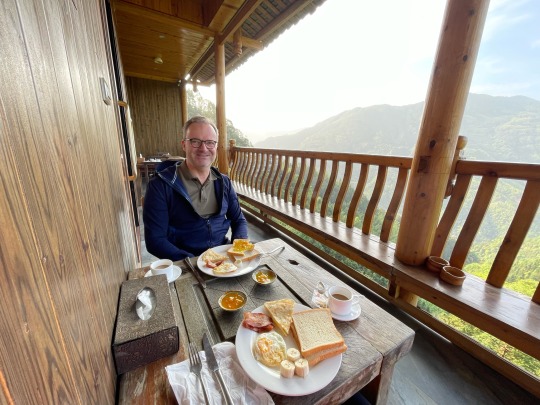

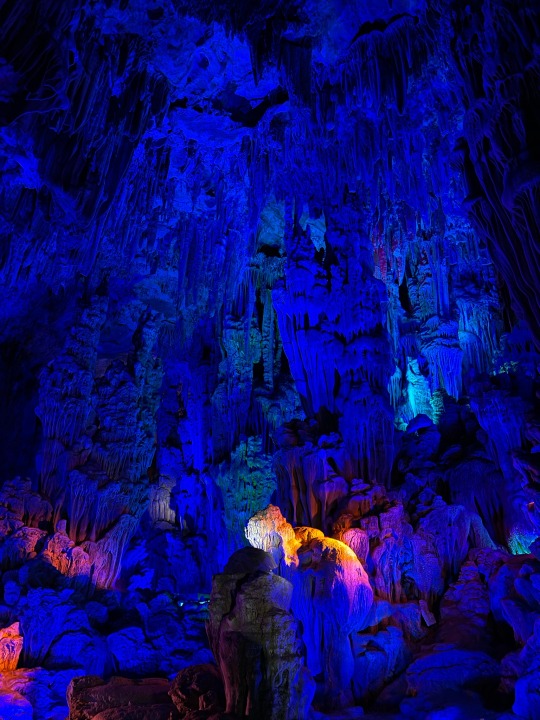



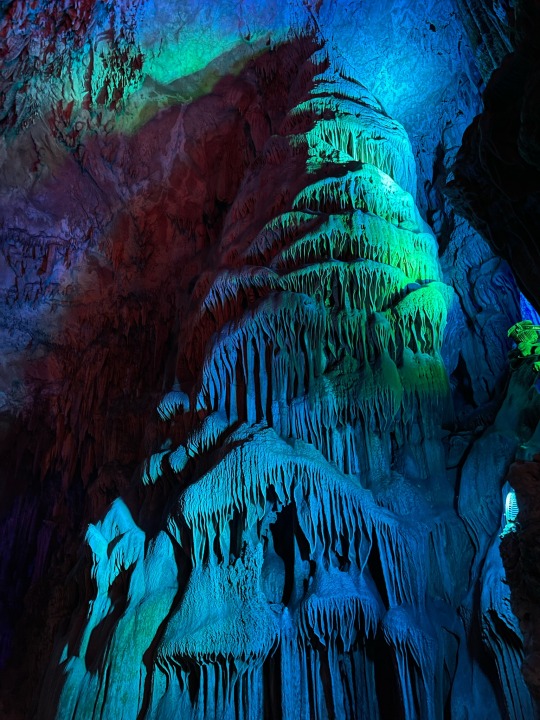
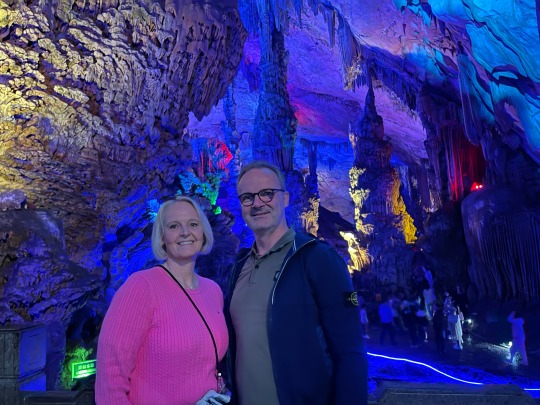


3 notes
·
View notes
Text
Fantasy/sci-fi world building inspiration (part 2)
Dallol volcano, Ethiopia (volcano, neon yellow edition)
Painted Dunes, Lassen Volcanic national park (beige and pink sand dunes)
Lake Retbal, Senegal (a sea of Pepto Bismol)
Bonneville Salt Flats, Utah (a perfect mirror when flooded, optical illusion when dry)
Richat Structure, Ouadane Mauritania (Earth’s version of the giant swirl on Jupiter)
Black Forest, Germany (fairy-tale forest, creepy edition)(yes this is where the ham comes from)
Moss Swamp, Romania (the yassified version of Shrek’s swamp)
Giant Kelp Forest, California (pretty sure they went here in Finding Dory)
Yakushima forest, Japan (fairy-tale forest)
The Tarkine Rainforest, Tasmania (fairy-tale forest, Tasmanian edition)
Sequoia National Park, California (biggest trees in the world. Also where they filmed Star Wars)
La Chiva Beach, Puerto Rico (bluest beach in the world)
Honopu beach, Kauai (giant ocean cliffs in Hawaii)
Crystal Cave, Bermuda (millions of white stalactites over crystal-clear water)
Reed Flute Cave, China (giant cave, rainbow edition)
Waitomo Glowworm Cave, New Zealand (like glow-in-the-dark stars stuck to the roof of a cave, but more magical)
Skocjan Cave, Slovenia (ENORMOUS scary-yet-awesome double-cave system)
Eisriesenwelt ice cave, Austria (largest ice cave in the world)
Krubera cave, Georgia (deepest cave on the planet)
#worldbuilding#moorkavia#writing#fantasy#scifi#scifi inspiration#scififantasy#star wars#travel#bucket list#placesyouveneverheardof#places
18 notes
·
View notes
Audio
VA - Spirit of France
Obscure, rare spiritual jazz, deep folk and psychedelia sounds from the French ‘70s - ‘80s underground
‘Spirit of France’ is an anthology celebrating the French artists whose total desire not to belong to a particular trend expanded their horizon by pushing the boundaries of creative music. Recording in caves during the full moon, or in the open air in Ibiza to celebrate the sun - with flutes, cromorne (French woodwind reed), darbouka and hurdy-gurdy, or with fascinating, unusual, artist-build instruments, with sounds heavily influenced from Indian, African, Arabic, Eastern and Malagasy cultures, this is what makes this compilation so unique.
Freedom of expression, experimental creativity and collaboration constitute the fuel for these hand picked artists – similar to Don Cherry’s influence on Colin Walcott and Kahil El’Zabar (in the field of jazz), and folk background artists like Robbie Basho and Sandy Bull; in Europe, the same approach was manifested in Italy with bassist Marcello Melis, the Sardinian singers from the Gruppo Rubanu, Aktuala and Futuro Antico. In France, Cossi Anatz, Nu Creative Methods and Sonorhc were also echoing the same approach.
‘Spirit of France’ – a long project in the making, is dedicated in unearthing more than just curiosities, instead focusing on never been reissued, obscure, artist-self-released music. Carefully curated by Spiritmuse Records’ Mark Gallagher and Thea Ioannou, and joined by young French digger Tom Val, ‘Spirit of France’ is an anthology of obscure spiritual jazz and its’ relationship with deep folk in the ‘70s - ‘80s French multi-cultural melting pot underground scene.
The album’s aim is evident from the outset, with Rémy Couvez’s aptly named ‘Rêve de Voyage’, illustrating the theme’s quest for imaginary folklore, continued with Workshop de Lyon, Jef Gilson – France’s spiritual jazz giant, Sylvain Kassap, Noco Music, Pân-Râ, L’Empire des Sons, Ghédalia Tazartès, and the mysterious Adjenar Sidar Khan. Some of these artists remain unacknowledged, yet they’re all extraordinary heroes of the French music avant-garde scene.
‘Spirit of France’ is a journey of imaginary folklore, blending spiritual jazz influences and deep folk, celebrating the unique sounds of the French avant-garde underground, at the crossroads of the tribal, the secular and the universal.
Curated by Mark Gallagher, Thea Ioannou & Tom Val
Design and Art Direction by Nep Sidhu
#compilation#various artists#spiritmuse records#70s#80s#jazz#spiritual jazz#avant-garde#folk#psych folk#eurovision 2020
3 notes
·
View notes
Text
4 days Guilin Highlights Tour of Li River, Yangshuo and Longji Terrace
Travel consultant Mobile/WhatsApp/WeChat: +86 13859984090
E-mail: [email protected]
Day 1: Guilin Arrival
Day 2: Guilin - Longsheng - Guilin, Longji Rice Terrace, Zhuang and Yao characteristic villages
Day 3: Guilin - Yangshuo, Li River Cruise, West Street
Day 4: Yangshuo - Guilin - Departure, Elephant Trunk Hill Park, Reed Flute Cave
#Guilintravel#YangshuoTour#LongjiTerrace#LiRriver#Guilinprivatetour#guilintavelagency#ChinaPrivateTour#TraveltoChina#ChinaMemoryTrip#iMemoryTrip
0 notes
Text

John Milton
Lycidas
Yet once more, O ye laurels, and once more
Ye myrtles brown, with ivy never sere,
I come to pluck your berries harsh and crude,
And with forc'd fingers rude
Shatter your leaves before the mellowing year.
Bitter constraint and sad occasion dear
Compels me to disturb your season due;
For Lycidas is dead, dead ere his prime,
Young Lycidas, and hath not left his peer.
Who would not sing for Lycidas? he knew
Himself to sing, and build the lofty rhyme.
He must not float upon his wat'ry bier
Unwept, and welter to the parching wind,
Without the meed of some melodious tear.
Begin then, Sisters of the sacred well
That from beneath the seat of Jove doth spring;
Begin, and somewhat loudly sweep the string.
Hence with denial vain and coy excuse!
So may some gentle muse
With lucky words favour my destin'd urn,
And as he passes turn
And bid fair peace be to my sable shroud!
For we were nurs'd upon the self-same hill,
Fed the same flock, by fountain, shade, and rill;
Together both, ere the high lawns appear'd
Under the opening eyelids of the morn,
We drove afield, and both together heard
What time the gray-fly winds her sultry horn,
Batt'ning our flocks with the fresh dews of night,
Oft till the star that rose at ev'ning bright
Toward heav'n's descent had slop'd his westering wheel.
Meanwhile the rural ditties were not mute,
Temper'd to th'oaten flute;
Rough Satyrs danc'd, and Fauns with clov'n heel,
From the glad sound would not be absent long;
And old Damætas lov'd to hear our song.
But O the heavy change now thou art gone,
Now thou art gone, and never must return!
Thee, Shepherd, thee the woods and desert caves,
With wild thyme and the gadding vine o'ergrown,
And all their echoes mourn.
The willows and the hazel copses green
Shall now no more be seen
Fanning their joyous leaves to thy soft lays.
As killing as the canker to the rose,
Or taint-worm to the weanling herds that graze,
Or frost to flowers that their gay wardrobe wear
When first the white thorn blows:
Such, Lycidas, thy loss to shepherd's ear.
Where were ye, Nymphs, when the remorseless deep
Clos'd o'er the head of your lov'd Lycidas?
For neither were ye playing on the steep
Where your old bards, the famous Druids, lie,
Nor on the shaggy top of Mona high,
Nor yet where Deva spreads her wizard stream.
Ay me! I fondly dream
Had ye bin there'—for what could that have done?
What could the Muse herself that Orpheus bore,
The Muse herself, for her enchanting son,
Whom universal nature did lament,
When by the rout that made the hideous roar
His gory visage down the stream was sent,
Down the swift Hebrus to the Lesbian shore?
Alas! what boots it with incessant care
To tend the homely, slighted shepherd's trade,
And strictly meditate the thankless Muse?
Were it not better done, as others use,
To sport with Amaryllis in the shade,
Or with the tangles of Neæra's hair?
Fame is the spur that the clear spirit doth raise
(That last infirmity of noble mind)
To scorn delights and live laborious days;
But the fair guerdon when we hope to find,
And think to burst out into sudden blaze,
Comes the blind Fury with th'abhorred shears,
And slits the thin-spun life. "But not the praise,"
Phoebus replied, and touch'd my trembling ears;
"Fame is no plant that grows on mortal soil,
Nor in the glistering foil
Set off to th'world, nor in broad rumour lies,
But lives and spreads aloft by those pure eyes
And perfect witness of all-judging Jove;
As he pronounces lastly on each deed,
Of so much fame in Heav'n expect thy meed."
O fountain Arethuse, and thou honour'd flood,
Smooth-sliding Mincius, crown'd with vocal reeds,
That strain I heard was of a higher mood.
But now my oat proceeds,
And listens to the Herald of the Sea,
That came in Neptune's plea.
He ask'd the waves, and ask'd the felon winds,
"What hard mishap hath doom'd this gentle swain?"
And question'd every gust of rugged wings
That blows from off each beaked promontory.
They knew not of his story;
And sage Hippotades their answer brings,
That not a blast was from his dungeon stray'd;
The air was calm, and on the level brine
Sleek Panope with all her sisters play'd.
It was that fatal and perfidious bark,
Built in th'eclipse, and rigg'd with curses dark,
That sunk so low that sacred head of thine.
Next Camus, reverend sire, went footing slow,
His mantle hairy, and his bonnet sedge,
Inwrought with figures dim, and on the edge
Like to that sanguine flower inscrib'd with woe.
"Ah! who hath reft," quoth he, "my dearest pledge?"
Last came, and last did go,
The Pilot of the Galilean lake;
Two massy keys he bore of metals twain
(The golden opes, the iron shuts amain).
He shook his mitred locks, and stern bespake:
"How well could I have spar'd for thee, young swain,
Enow of such as for their bellies' sake
Creep and intrude, and climb into the fold?
Of other care they little reck'ning make
Than how to scramble at the shearers' feast
And shove away the worthy bidden guest.
Blind mouths! that scarce themselves know how to hold
A sheep-hook, or have learn'd aught else the least
That to the faithful herdman's art belongs!
What recks it them? What need they? They are sped;
And when they list their lean and flashy songs
Grate on their scrannel pipes of wretched straw,
The hungry sheep look up, and are not fed,
But, swoll'n with wind and the rank mist they draw,
Rot inwardly, and foul contagion spread;
Besides what the grim wolf with privy paw
Daily devours apace, and nothing said,
But that two-handed engine at the door
Stands ready to smite once, and smite no more".
Return, Alpheus: the dread voice is past
That shrunk thy streams; return, Sicilian Muse,
And call the vales and bid them hither cast
Their bells and flow'rets of a thousand hues.
Ye valleys low, where the mild whispers use
Of shades and wanton winds, and gushing brooks,
On whose fresh lap the swart star sparely looks,
Throw hither all your quaint enamel'd eyes,
That on the green turf suck the honied showers
And purple all the ground with vernal flowers.
Bring the rathe primrose that forsaken dies,
The tufted crow-toe, and pale jessamine,
The white pink, and the pansy freak'd with jet,
The glowing violet,
The musk-rose, and the well attir'd woodbine,
With cowslips wan that hang the pensive head,
And every flower that sad embroidery wears;
Bid amaranthus all his beauty shed,
And daffadillies fill their cups with tears,
To strew the laureate hearse where Lycid lies.
For so to interpose a little ease,
Let our frail thoughts dally with false surmise.
Ay me! Whilst thee the shores and sounding seas
Wash far away, where'er thy bones are hurl'd;
Whether beyond the stormy Hebrides,
Where thou perhaps under the whelming tide
Visit'st the bottom of the monstrous world,
Or whether thou, to our moist vows denied,
Sleep'st by the fable of Bellerus old,
Where the great vision of the guarded mount
Looks toward Namancos and Bayona's hold:
Look homeward Angel now, and melt with ruth;
And, O ye dolphins, waft the hapless youth.
Weep no more, woeful shepherds, weep no more,
For Lycidas, your sorrow, is not dead,
Sunk though he be beneath the wat'ry floor;
So sinks the day-star in the ocean bed,
And yet anon repairs his drooping head,
And tricks his beams, and with new spangled ore
Flames in the forehead of the morning sky:
So Lycidas sunk low, but mounted high
Through the dear might of him that walk'd the waves;
Where, other groves and other streams along,
With nectar pure his oozy locks he laves,
And hears the unexpressive nuptial song,
In the blest kingdoms meek of joy and love.
There entertain him all the Saints above,
In solemn troops, and sweet societies,
That sing, and singing in their glory move,
And wipe the tears for ever from his eyes.
Now, Lycidas, the shepherds weep no more:
Henceforth thou art the Genius of the shore,
In thy large recompense, and shalt be good
To all that wander in that perilous flood.
Thus sang the uncouth swain to th'oaks and rills,
While the still morn went out with sandals gray;
He touch'd the tender stops of various quills,
With eager thought warbling his Doric lay;
And now the sun had stretch'd out all the hills,
And now was dropp'd into the western bay;
At last he rose, and twitch'd his mantle blue:
To-morrow to fresh woods, and pastures new.
E.M 2024
0 notes
Text
The Big Picture: The marvelous Reed Flute Cave.
CREDIT: Dennis Jarvis.
Reed Flute Cave, situated in Guilin, Guangxi, China, is a magnificent natural limestone cave renowned for its captivating stalactite and stalagmite formations. These formations result from the deposition of minerals as water drips over time.
Stalactites, the icicle-shaped structures, dangle from cave ceilings and emerge as water drops from above, leaving behind the…

View On WordPress
0 notes

